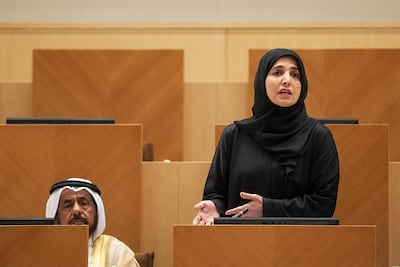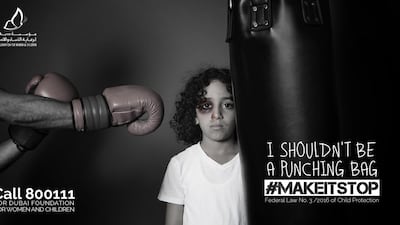New jail terms and restraining orders have been introduced to tackle domestic violence and protect families from intimidation and threats.
Judges and prosecutors will have the power to prevent abusive spouses from going near their partners or children, or bombarding them with calls and messages.
Until now, a husband or wife could be convicted of harassing or assaulting his or her partner – but would not be prevented from approaching them on release from jail or payment of a fine.
"How can we protect the victim without such an order?" Afra Al Basti, director general of Dubai Foundation for Women and Children, a shelter for victims of domestic abuse and human trafficking, told The National.
“It will help prevent violence from escalating. Violence as a behaviour can develop from abusive words to abusive acts of physical assault and even murder.
“This order will also provide an opportunity for all to step back and reconcile.”
The measure is part of a series of legal changes passed by the Cabinet and part of the Family Protection Policy announced by Sheikh Mohammed bin Rashid, Prime Minister and Ruler of Dubai, last month.
The changes are seen as a long-awaited update of domestic violence laws, which are controversial, complex and have foundations in Sharia.
In 2010, the UAE Federal Supreme Court ruled that a man had the right to discipline his wife and children provided he did not leave physical marks. The ruling led to criticism by human rights groups and local politicians.
Specific punishments have also been implemented for domestic violence, including a maximum six-month jail term and Dh5,000 fine. The punishment for a second offence is twice that.
Until now, an abuser would have been prosecuted for assault or making offensive comments, for example.
The UAE does not regularly publish crime statistics, including for domestic violence, making it difficult to assess the scale of the issue. But this year, the foundation said it dealt with 1,027 cases in 2018. That included 526 reported cases of domestic violence and 52 instances of reported child abuse.

The law now recognises the ‘physical, emotional and sexual’ abuse of a relative in a domestic context, along with ‘economic abuse’.
Dubai Foundation for Women and Children said ‘financial abuse’ was cited in 58 per cent of cases.
The charges are not restricted to male relatives, though they are commonly the perpetrators.
"The law does not only provide protection to couples and their children, but also to any of the partner's children from previous marriages, the couple's parents, fourth-degree relatives and fostered members of the family," said Hassan Elhais, a legal consultant from Al Rowaad Advocates and legal columnist for The National.
“It’s important to clarify that this law added one more layer of child protection, as it has been already provided as part of the country’s child protection law,” he said.
Restraining orders are used in Europe and North America, among other places.
“I’ve seen cases of women who were pestered by their ex-husbands,” Dr Elhais said.
“They either called them repeatedly or called them at late hours, or showed up for kids’ visitation outside court-decided schedules,” he said.
“In one case, a man stalked his former wife by sitting at a cafe in the building where she lived, monitoring all her movements.”
The domestic violence laws can be used to tackle bad behaviour that could be overlooked or dealt with as a minor misdemeanour.
“Filing a criminal case against an ex-partner for disturbing them via phone calls could lead to a fine, but with the stiffened punishment for violating a restraining order, this means the order will act as a stronger deterrent,” he said.
Breaching the restraining order carries a three-month jail sentence and/or a fine of between Dh1,000 and Dh10,000. The penalty can be doubled if violence is involved.
A prosecutor can, at the victim’s behest on on their own accord, issue a 30-day order that can be extended twice. A third extension must be obtained from court and would last for six months. Either party, victim or offender, can petition against the restraining order within seven days of its issuance date.
Speaking last week, Hessa Buhumaid, Minister of Community Development, said a series of measures will be put in place to protect families.
“We in the UAE do not tolerate any kind of violence towards children, elderly people or women," she said.
Dubai’s courts have dealt with a series of domestic violence cases in which perpetrators were prosecuted under existing assault and violence laws.
Most recently, an Emirati soldier was handed a suspended prison sentence in July for setting fire to his ex-wife's Mirdif apartment and threatening her with a knife following an argument.


